Nature
Dogma
Ritual
Enochian
Lemegeton
Thelema
Solve et Coagula
The Three Prime Essences |
||||||||||||||||||||||||||||||
|
"Every body consists of three ingredients. The names of these are Sulphur, Mercury, and Salt." - Paracelsus |
||||||||||||||||||||||||||||||
Contents |
||||||||||||||||||||||||||||||
Sulphur |
||||||||||||||||||||||||||||||
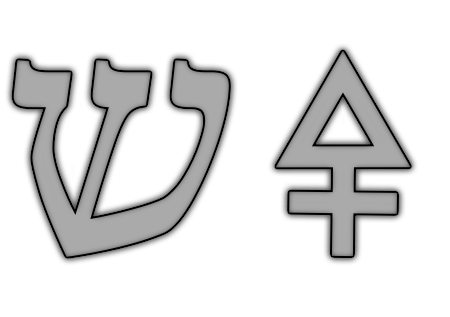
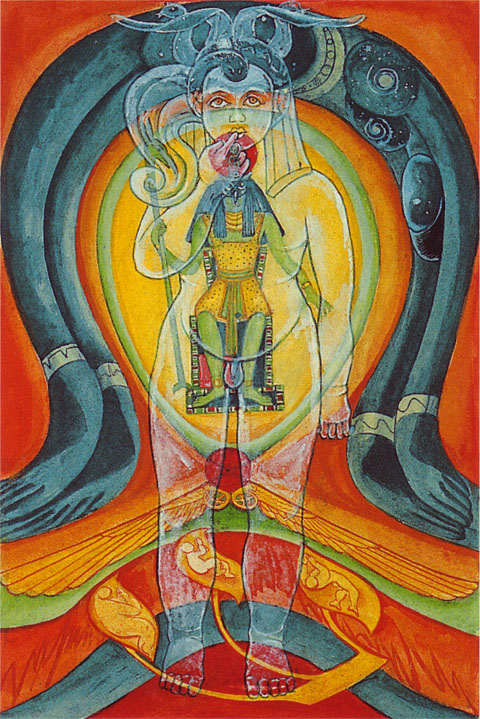
The Book of Formation - ספר היצירה (Sepher Yetzirah)Chapter Three; 'משנה ט - Verse NineHe made ש (sheen) king (מליך) over fire And He bound a crown (כתר) to it And He combined one with another And with them He formed Heaven (שמים) in the Universe (עולם), Hot in the Year, And the head (ראש) in the Soul (נפש): The male with שא"ם And the female with שמ"א. The Bhagavad GitaThe Different Gunas
The Hermetic and Alchemical Writings of Paracelsus the GreatParamirum, Liber IMorbific Effects of Sulphur, Salt, and Mercury.With regard to Sulphur, its effect should be thus estimated. It never produces an evil effect by itself, unless it be
astral, that is, unless a spark of fire shall have been cast into it. Then is power awakened by that spark. Is not the act
of burning a virile one? Without it nothing is produced. So, then, if any disease declare itself from Sulphur, then, first
of all, the Sulphur should be properly named. It is essentially a masculine operation. There are many sulphurs, such as
resin, gums, botin, axungia, fat, butter. oil, vinum ardens, etc. There are some sulphurs of woods, some of animals, some of
men, some of metals, as oil of gold, of Luna, of Mars; some of stones, as liquor of marble, of alabaster, etc. ; some of
seeds, and of all other things, each with their own special names. There is afterwards the fire falling upon each, which
alone is their star, and this, too, with its distinguishing name. And this operation is, in one respect, peccant matter. Appendix 1. Concerning the Three Prime EssencesChapter Isulphur either governs the excess which arises from the two others, or it is dissolved Chapter IIISulphur operates by drying and consuming that which is superfluous. Whether this proceeds from itself or from others, it must be completely consumed by means of sulphur, if it be not subject to salts. Thus, a medicine for dropsy is made of the salts produced out of the liver of the Archeus to consume the putrefied and corrupt. But to remove the disease itself the strength of sulphur is necessary, to which diseases of this kind are subjected in virtue of their origin. Yet, it is not every kind of sulphur which will effect this purpose, and so it results from the nature of the element that every sickness produced by the nature of the body has its contrary from the nature of the element. This takes place both universally and particularly, and, consequently, from the genera of an element the genera of diseases may be recognised. One is always the sign and proof of the other. |
||||||||||||||||||||||||||||||
Salt |
||||||||||||||||||||||||||||||
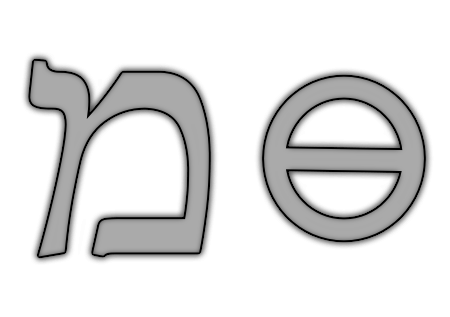
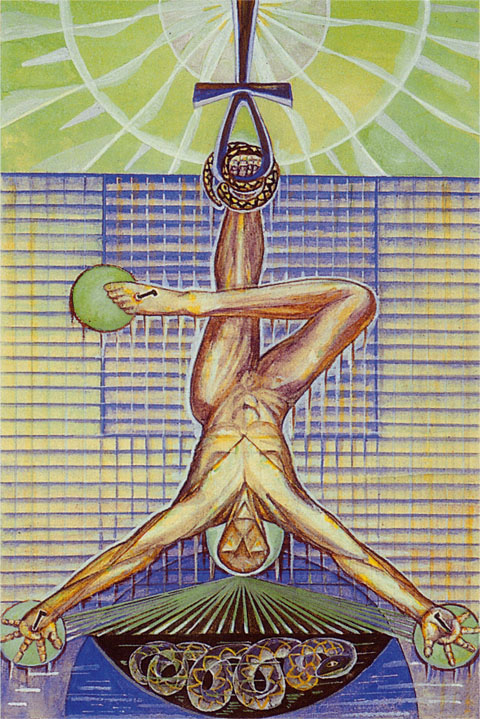
The Book of Formation - ספר היצירה (Sepher Yetzirah)Chapter Three; 'משנה ח - Verse EightHe made מ (mem) king (מליך) over water (מים) And He bound a crown (כתר) to it And He combined one with another And with them He formed Earth (ארץ) in the Universe (עולם), Cold in the Year, And the belly in the Soul (נפש): The male with מא"ש And the female with מש"א. The Bhagavad GitaThe Different Gunas
The Hermetic and Alchemical Writings of Paracelsus the GreatParamirum, Liber IMorbific Effects of Sulphur, Salt, and Mercury.Moreover, with regard to Salt it should be known that it exists of itself as a material humour, and introduces no disease
unless it be joined with its star. Its star is resolution, which gives it a masculine power. Salt, no less than the spirit
of vitriol, tartar, alum, nitre, etc., exhibits itself tumultuously if it is resolved. Now, whence can such a nature be
infused into humours, except by a star? About this physicians have formed a conspiracy of silence. Even if they had been
guilty of no other blunder save that in all their causes and cures they had omitted the star, that would have been quite
sufficient to prove that they had built their house on a foundation of moss and sand. You should know, also, that salts are
manifold. Some are limes, some ashes, some arsenical, some antimonial, some marchasitic, and others of a similar sort. And
from all of these are produced and begotten peculiar diseases according to the body of the salt; which diseases thereupon
take the name and nature special to each. Appendix 1. Concerning the Three Prime EssencesChapter IThis works by purging, cleansing, balsaming, and by other ways, and rules over that which goes off in putrefaction. Chapter IISalts purify, but after various manners, some by secession, and of these there are two kinds-one the salt of the thing, which digests things till they separate--the other the salt of Nature, which expels. Thus, without salt, no excretion can take place. Hence it follows that the salt of the vulgar assists the salts of Nature. Certain salts purge by means of vomiting-. Salts of this kind are exceedingly gross, and, if they do not pass off in digestion, will produce strangulation in the stomach. Some salts purge by means of perspiration. Such is that most subtle salt which unites with the blood. Now, salts which produce evacuation and vomiting do not unite with the blood, and, consequently, produce no perspiration. Then it is the salt only which separates. Other salts purge through the urine, and urine itself is nothing but a superfluous salt, even as dung is superfluous sulphur. No liquor superfluously departs from the body, for the same remains within. Such are all the evacuations of the body, moisture expelled by salt through the nostrils, the ears, the eyes, and other ways. This is understood to take place by means of the Archeus from these evacuations. Now, as out of the Archeus a laxative salt comes forth, of which one kind purges the stomach because it proceeds from the stomach of the Archeus, so another purges the spleen because it comes from the spleen of the Archeus; and it is in like manner with the brain, the liver, the lungs, and other members, every member of the Archeus acting upon the corresponding member of the Microcosmus. Chapter IVEvery relaxing disease is generated from salt, as dysentery, diarrhrea, lienteria, etc. Every expulsion is caused by
salt, which remains in its place, whether in a healthy or suffering subject. The salt in the one case is, however, that of
Nature, while in the other it is corrupted and dissolved. Cure must be accomplished by means of the same salts from which
the disease had origin, even as fresh salt will rectify and purify dissolved salt. The sulphureous cure follows as a
certain confirmation of the operation in salt. |
||||||||||||||||||||||||||||||
Mercury |
||||||||||||||||||||||||||||||
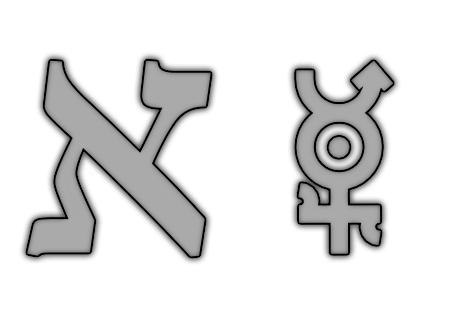

The Book of Formation - ספר היצירה (Sepher Yetzirah)Chapter Three; 'משנה ז - Verse SevenHe made the letter א (aleph) king (מליך) over Breath (רוח) And He bound a crown (כתר) to it And He combined them one with another And with them He formed Air in the Universe (עולם), The temperate in the Year, And the chest in the Soul (נפש): The male with אמ"ש And the female with אש"ם. The Bhagavad GitaThe Different Gunas
The Hermetic and Alchemical Writings of Paracelsus the GreatParamirum, Liber IMorbific Effects of Sulphur, Salt, and MercurySo, too, understand concerning Mercury. This of itself is not virile unless the star of Sol sublimates it. Otherwise it
does not ascend. Its preparations are many, but there is only one body. But the body of this is not like Sulphur or Salt,
which have many bodies, from whence come different salts and different sulphurs. This has only one body, but the star
changes this in different ways, and into various natures. So, then, from the same source many diseases are produced. Thus
its masculine nature comes from the star, and by this nature it has its morbific effect. Chapter IVAll diseases of the arteries, ligaments, bones, nerves, etc., arise from mercury. In the rest of the body the substance of corporeal mercury does not dominate. It prevails only in the external members. Appendix 1. Concerning the Three Prime EssencesChapter Iit removes that which changes into consumption Chapter IIIThe same sign occurs in the case of mercury; it assumes that which separates from salt and sulphur. Hence are produced diseases of the ligaments, arteries, joints, limbs, and the like. Hence in these diseases we must simply remove the liquor of mercury. But the ailments themselves ought to be removed by those things which are favourable and conducive to them, when proof has been obtained of the speciality of the thing in Nature. |
||||||||||||||||||||||||||||||
The Book of Formation - ספר היצירה (Sepher ha-Yetzirah) |
||||||||||||||||||||||||||||||
Chapter Three
|
||||||||||||||||||||||||||||||
The Bhagavad Gita |
||||||||||||||||||||||||||||||
The Different Gunas
|
||||||||||||||||||||||||||||||
The Hermetic and Alchemical Writings of Paracelsus the Great |
||||||||||||||||||||||||||||||
|
The Hermetic and Alchemical Writings of Aureolus Philippus Theophrastus Bombast, of Hohenheim, called Paracelsus the Great.
Vol. II Edited with a biographical preface, elucidatory notes, a copious hermetic vocabulaty, and index, by Arthur Edward Waite. Referenced in a footnote to The Manual or Treatise Concerning the Medicinal Philosophic Stone: Paramirum, Liber I.On the Origin of Diseases from the Three Primary Substances.There are three substances which confer its own special body on everything, that is to say, every body consists of three ingredients. The names of these are Sulphur, Mercury, and Salt. When these three are compounded, then they are called a Body ; and nothing is added to, or coheres with, them save and except the vital principle. Thus, if you take any body in your hands, then you have invisibly three substances under one form. We have now to discuss concerning these three. For these three substances exist under one form, and they give and produce all health. If you hold wood in your hand, then by the testimony of your eyes you have only one body. But it is of no advantage for you to know this. The clowns see and know as much. You should descend and penetrate beneath the surface, when you would learn that you are pressing in your hands Sulphur, Mercury, and Salt. Now if you can detect these three things by looking, touching, and handling them, and perceive them separated each from the other, then at last you have found those eyes with which a physician ought to see. Those eyes ought to see these three constituents as plainly as the clown certainly sees the crude wood. Now this example may make you able to recognise man, too, in these three, no less than wood itself. That is, you have man built up in a similar form. If you see only his bones, you see as the clown sees. But if you have separated his Sulphur, his Mercury, and his Salt, then you see clearly what a bone is, and if that bone be diseased you see where it is faulty, and from what cause, and how it suffers. So, then, the men: looking at externals is a matter for clowns; but the intuition of internals is a secret which belongs to physicians. Now if these visible things must exist; and beyond their mere aspect medicine fails, then their nature must be deduced so that it may lay itself bare and be exhibited. Moreover, see into what ultimate matter these things are resolved, and into how many kinds. You will find these three substances divided from one another into just as many kinds. Now the clown cares nothing about all this; but the physician cares. The mere experimentalist neglects it, but not the physician. The quack thinks nothing of it ; but the physician considers a good deal. Before all else these three substances and their properties in the great universe should be understood. Then the investigator will find the same or similar properties in man also: so that he now understands what he has in his hands, and of what he is making himself master. Morbific Effects of Sulphur, Salt, and Mercury.With regard to Sulphur, its effect should be thus estimated. It never produces an evil effect by itself, unless it be astral, that is, unless a spark of fire shall have been cast into it. Then is power awakened by that spark. Is not the act of burning a virile one? Without it nothing is produced. So, then, if any disease declare itself from Sulphur, then, first of all, the Sulphur should be properly named. It is essentially a masculine operation. There are many sulphurs, such as resin, gums, botin, axungia, fat, butter. oil, vinum ardens, etc. There are some sulphurs of woods, some of animals, some of men, some of metals, as oil of gold, of Luna, of Mars; some of stones, as liquor of marble, of alabaster, etc. ; some of seeds, and of all other things, each with their own special names. There is afterwards the fire falling upon each, which alone is their star, and this, too, with its distinguishing name. And this operation is, in one respect, peccant matter. Moreover, with regard to Salt it should be known that it exists of itself as a material humour, and introduces no disease unless it be joined with its star. Its star is resolution, which gives it a masculine power. Salt, no less than the spirit of vitriol, tartar, alum, nitre, etc., exhibits itself tumultuously if it is resolved. Now, whence can such a nature be infused into humours, except by a star? About this physicians have formed a conspiracy of silence. Even if they had been guilty of no other blunder save that in all their causes and cures they had omitted the star, that would have been quite sufficient to prove that they had built their house on a foundation of moss and sand. You should know, also, that salts are manifold. Some are limes, some ashes, some arsenical, some antimonial, some marchasitic, and others of a similar sort. And from all of these are produced and begotten peculiar diseases according to the body of the salt; which diseases thereupon take the name and nature special to each. So, too, understand concerning Mercury. This of itself is not virile unless the star of Sol sublimates it. Otherwise it does not ascend. Its preparations are many, but there is only one body. But the body of this is not like Sulphur or Salt, which have many bodies, from whence come different salts and different sulphurs. This has only one body, but the star changes this in different ways, and into various natures. So, then, from the same source many diseases are produced. Thus its masculine nature comes from the star, and by this nature it has its morbific effect. If, then, all diseases are comprised under these three heads, each with its own name and title, know that you must reduce to Sulphur all that is sulphureous, in the sense that it burns. What is Mercurial should be reduced by sublimation if it be adapted thereto. What is from Salt should be reduced to such salt as is appropriate. These, then. are the three general causes of disease, as we have grouped them together above. Appendix 1. Concerning the Three Prime EssencesChapter I.Every thing which is generated and produced of its elements is divided into three, namely, into Salt, Sulphur, Mercury. Out of these a conjunction takes place, which
constitues one body and an united essence. This does not concern the body in its outward aspect, but only the internal nature of the body. Chapter II.Salts purify, but after various manners, some by secession, and of these there are two kinds-one the salt of the thing, which digests things till they separate--the
other the salt of Nature, which expels. Thus, without salt, no excretion can take place. Hence it follows that the salt of the vulgar assists the salts of Nature.
Certain salts purge by means of vomiting-. Salts of this kind are exceedingly gross, and, if they do not pass off in digestion, will produce strangulation in the
stomach. Some salts purge by means of perspiration. Such is that most subtle salt which unites with the blood. Now, salts which produce evacuation and vomiting do not
unite with the blood, and, consequently, produce no perspiration. Then it is the salt only which separates. Other salts purge through the urine, and urine itself is
nothing but a superfluous salt, even as dung is superfluous sulphur. No liquor superfluously departs from the body, for the same remains within. Such are all the
evacuations of the body, moisture expelled by salt through the nostrils, the ears, the eyes, and other ways. This is understood to take place by means of the Archeus
from these evacuations. Now, as out of the Archeus a laxative salt comes forth, of which one kind purges the stomach because it proceeds from the stomach of the
Archeus, so another purges the spleen because it comes from the spleen of the Archeus; and it is in like manner with the brain, the liver, the lungs, and other members,
every member of the Archeus acting upon the corresponding member of the Microcosmus. Chapter III.Sulphur operates by drying and consuming that which is superfluous. Whether this proceeds from itself or from others, it must be completely consumed by means of
sulphur, if it be not subject to salts. Thus, a medicine for dropsy is made of the salts produced out of the liver of the Archeus to consume the putrefied and corrupt.
But to remove the disease itself the strength of sulphur is necessary, to which diseases of this kind are subjected in virtue of their origin. Yet, it is not every kind
of sulphur which will effect this purpose, and so it results from the nature of the element that every sickness produced by the nature of the body has its contrary from
the nature of the element. This takes place both universally and particularly, and, consequently, from the genera of an element the genera of diseases may be recognised.
One is always the sign and proof of the other. Chapter IV.The physician should understand the three genera of all diseases as follows. One genus is of salt, one of sulphur, and one of mercury. Every relaxing disease is generated from salt, as dysentery, diarrhrea, lienteria, etc. Every expulsion is caused by salt, which remains in its place, whether in a healthy or suffering subject. The salt in the one case is, however, that of Nature, while in the other it is corrupted and dissolved. Cure must be accomplished by means of the same salts from which the disease had origin, even as fresh salt will rectify and purify dissolved salt. The sulphureous cure follows as a certain confirmation of the operation in salt. All diseases of the arteries, ligaments, bones, nerves, etc., arise from mercury. In the rest of the body the substance of corporeal mercury does not dominate. It prevails only in the external members. Sulphur softens and nourishes the internal organs, as the heart, brain, and veins, and their diseases also may be termed sulphureous, for a sulphureous substance is present in them. Let us take colic as an example. Salt is the cause of this, because this predominates in the intestines. In its dissolved state it produces one kind of colic, and when it is excessively hard it produces another kind; for when it passes from its own temperature it becomes excessively humid or excessively dry. In the cure of colic by elemented salts the human salt must be rectified. But if a salt other than from sulphur be applied, you must regard it as a submersion of salt and not a cure of colic. Similarly, in the case of mercurial and sulphureous diseases, each must be administered to its counterpart, not a contrary to a contrary. The cold does not subdue the hot, nor vice versa, in congenital diseases. The cure proceeds from the same source as the disease,and has generated the place thereof. Chapter V.The genera of diseases are also divided into various branches, locusts, and leaves. Yet is there one cure. The mercurial disease is an instance, for mercurial liquor separates into many branches, locusts, and leaves. So all varieties of pustules are subject to Mercury, because the disease is mercurial. But some are subject to common and others to metallic mercury, some to mercury xylohebenus, some to mercury of antimony. It is necessary, therefore, to know that liquor of mercury, which cures that which the salt of mercury dissolves, and it has also an incarnative virtue. For mercury is multiplex. [...] Consequently, the physician should know the tree of diseases and the tree of natural substances, but of these there are indeed many. There is the tree of salt, which is twofold, namely, of rebis and of the element. There is also the tree of sulphur and there is the tree of mercury. Accordingly, the physician must guard against inserting two trees into one cure; he must remember that Mercury must be administered for mercurial, salt for saline, and sulphur for sulphurous diseases. To each malady let the corresponding remedy be applied. So are there only three medicines as there are three forms of diseases. [...] Chapter VII.Ginger is diaphoretic by reason of the salt out of the body whereof it is made. But that virtue belongs to the fire, through which generations boil
up, as is held in philosophy, and by reason of this boiling up it removes obstacles, and reduces or elevates the humours of sulphur, salt, and Mercury
to the second, third, and fourth grade of ebullition. And as it is constituted out of the igneous nature of salt, so it also ascends a grade, by which grade
the humidities distil through the pores and guttas. Thus purifiers perform their work by the sole force of salt, as, for example, honey. The balm of salt
is situated in honey, which, consequently, does not putrefy. For balm is the most noble salt which Nature has produced. |
||||||||||||||||||||||||||||||
De Occulta Philosophia, Liber Segundis |
||||||||||||||||||||||||||||||
CHAPTER VI
|
| In Archetypo. | Pater |
שדי Sadai Filius |
Spūs ſctūs |
Nomē dei trium literarum Tres perſonæ in diunis. |
| In mundo intellectuali. | Suprema Innocentes |
Media Martyres |
Infima Cōfeſſores |
Tres hierarchiæ angelorum, Tres gradus beatorum. |
| In mundo cœleſti. | Mobilia Cardines Diurnus |
Fixa Succedentes Nocturnus |
Cōmunia Cadentes Particeps |
Tres quaterniones ſignorū. Tres quaterniones domorū. Tres domini triplicitatum. |
| In mundo elementali. | Simplicia | Compoſita | Decōmpoſita | Tres gradus elementorum. |
| In minore mundo. | Caput ī quo uiget intellectus reſpōdens mundo intellectuali. | Pectus, ubi cor ſedes uitæ, reſpondens mūdo cœleſti. | Vēter, ubi gignitua uirtus [menbraq]; genitalia, reſpondēs mundo elementali. | |
| In mundo infernali. | Alecto Minos Malefici |
Megara Aeacus Apoſtatæ |
Cteſiphone Rhadamāt⁹ Infideles |
Tres furiæ infernales. Tres iudices infernales. Tres gradus damnatorum. |